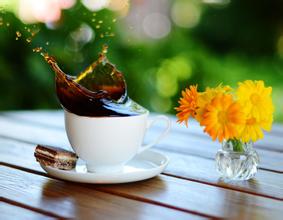Introduction to the taste of El Salvador coffee beans produced by the method of grinding and calibration
Introduction to the taste of El Salvador coffee beans produced by the method of grinding and calibration
Salvadoran coffee ranks side by side with Mexico and Guatemala as the producers of Asa and Merdo, and is fighting for the top one or two places in China and the United States with other countries. The highlands of origin are large coffee beans of all sizes, which are fragrant and mild in taste. Like Guatemala and Costa Rica, coffee in El Salvador is graded according to altitude. The higher the altitude, the better the coffee. It is divided into three grades according to elevation: SHB (strictly high grown) = highlands, HEC (high grown central) = mid-highlands, and CS (central standard) = lowlands. The best brand is Pipil, which is what the Aztec-Mayan (Aztec-Mayan) called coffee, which has been recognized by the American Organic Certification Society (Organic Certified lnstitut eof America).
El Salvador is one of the small countries in Central America with a very dense population. People here love coffee. The coffee in El Salvador tastes well balanced. Salvadoran coffee exports account for 40% of the country's exports. The best quality coffee is exported from January to March each year, and 35% of the extra hard beans are exported to Germany. In the early 1990s, due to the impact of war, the national economy of El Salvador was greatly damaged, even destroyed. Coffee production dropped from 3.5 million bags in the early 1970s to 2.5 million bags in El Salvador from 1990 to 1991. It is located in northwest Central America and is bordered by the Pacific Ocean to the south. It is one of the birthplaces of ancient Mayan civilization. The nearby volcanoes, plateaus, lakes and bathing beaches along the Pacific coast are all very pleasant. But nothing makes El Salvador most famous for its unique, mild coffee.
The civil war caused chaos and affected economic development, but ironically allowed the ancient coffee to be preserved, and the situation was so chaotic that coffee producers in El Salvador failed to catch up with the renewal of coffee varieties in Central and South America.
El Salvador produces 100% Arabica coffee, of which 68% is Bourbon, Coffea arabica var. Bourbon), 29% Pacas, other varieties including Pacamara,Caturra, etc.
The Pacas variety, first discovered in El Salvador in 1949, is a natural hybrid between bourbon and Catura.
The variety Pacamara, which was artificially bred by pacas and maragogipe (or maragogype), was first bred in 1958 (1954). Pacamara species is a rare artificial breeding of excellent varieties, blue is better than blue, perfectly inheriting the advantages of the mother plant, both the excellent taste of pacas species, raw bean granules also inherited the large size of malagogipe. The Pacamara species is thought to be the result of the pursuit of large Arabica species.

Important Notice :
前街咖啡 FrontStreet Coffee has moved to new addredd:
FrontStreet Coffee Address: 315,Donghua East Road,GuangZhou
Tel:020 38364473
- Prev

Introduction to the Regional treatment of Flavor and Flavor varieties of hand-made Coffee from Kenya aa
Kenya aa coffee handbrew scheme features flavor variety regional treatment method this stage requires a total of 6 concentric circles. After the smallest flow of water is injected into the center point by hand for 2 seconds, the concentric circle is around the first circle, and then each concentric circle is enlarged 1 turn accordingly. To the fifth concentric circle, about 12.5px away from the wall of the filter cup, all powder layers will be wet to water and washed away. Then, go on.
- Next

Evaluation characteristics of Burundian coffee beans an introduction to the taste treatment method of flavor description in producing areas
Evaluation characteristics of Burundian coffee beans: flavor description of Burundian coffee beans: dry aroma (1-5): not applicable wet aroma (1-5): not applicable acidity (brightness) (1-10): not applicable taste (hierarchical) (1-10): not applicable taste (alcohol thickness) (1-5): not applicable aftertaste (residue) (1-10): not applicable balance (1-5): not applicable
Related
- Detailed explanation of Jadeite planting Land in Panamanian Jadeite Manor introduction to the grading system of Jadeite competitive bidding, Red bid, Green bid and Rose Summer
- Story of Coffee planting in Brenka region of Costa Rica Stonehenge Manor anaerobic heavy honey treatment of flavor mouth
- What's on the barrel of Blue Mountain Coffee beans?
- Can American coffee also pull flowers? How to use hot American style to pull out a good-looking pattern?
- Can you make a cold extract with coffee beans? What is the right proportion for cold-extracted coffee formula?
- Indonesian PWN Gold Mandrine Coffee Origin Features Flavor How to Chong? Mandolin coffee is American.
- A brief introduction to the flavor characteristics of Brazilian yellow bourbon coffee beans
- What is the effect of different water quality on the flavor of cold-extracted coffee? What kind of water is best for brewing coffee?
- Why do you think of Rose Summer whenever you mention Panamanian coffee?
- Introduction to the characteristics of authentic blue mountain coffee bean producing areas? What is the CIB Coffee Authority in Jamaica?

